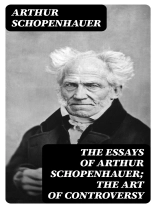In ‘The Essays of Arthur Schopenhauer: The Art of Controversy’, Schopenhauer explores the art of debate and argumentation with his signature philosophical insight and wit. Written in a clear and concise style, the essays dissect the various strategies and fallacies employed in disputations, offering valuable advice on how to win arguments skillfully and effectively. Schopenhauer’s work is not only a guide for mastering the art of controversy but also serves as a profound reflection on human nature and the nature of truth in the context of intellectual discourse. Drawing from classical rhetoric and his own unique perspective, Schopenhauer provides readers with a timeless study on the power of language and persuasion. Arthur Schopenhauer, a renowned German philosopher known for his pessimistic views on human existence, wrote ‘The Art of Controversy’ as a response to the intellectual climate of his time, marked by fierce debates and conflicting ideologies. His deep knowledge of philosophy, psychology, and logic informs the essays, making them essential reading for anyone interested in the nature of argumentation and debate. I highly recommend ‘The Essays of Arthur Schopenhauer: The Art of Controversy’ to readers seeking to sharpen their critical thinking skills and deepen their understanding of the intricate dynamics of intellectual discourse.
Sobre el autor
Arthur Schopenhauer (1788–1860) stands in the pantheon of Western philosophers. His work has had a profound impact on a diverse range of thinkers, including Friedrich Nietzsche, Richard Wagner, and Sigmund Freud. Schopenhauer was born in Danzig (now Gdańsk, Poland) to a prosperous merchant family. Uniquely influenced by both Eastern philosophy and the Western philosophical tradition, Schopenhauer developed his main philosophical work, ‘The World as Will and Representation’, in which he expressed an innovative, pessimistic worldview that emphasized the primordial will as the driving force of existence. Schopenhauer’s style is known for its clarity, rigor, and accessibility, setting him apart from his predecessor Hegel, whose work he famously criticized. Aside from his major treatise, Schopenhauer was also well-regarded for his essays and aphorisms, of which ‘The Essays of Arthur Schopenhauer; the Art of Controversy’ is an notable collection. In this work, Schopenhauer provides readers with a guide to effective argumentation, exposing various dialectical tactics and fallacies, reflecting not only his acumen as a philosopher but also as a shrewd observer of human nature. Despite living much of his life in relative obscurity, his posthumous influence grew steadily, rendering his philosophical contributions an enduring part of the intellectual discourse.












